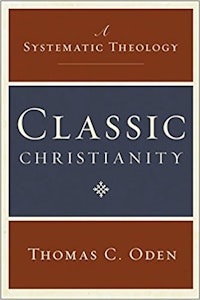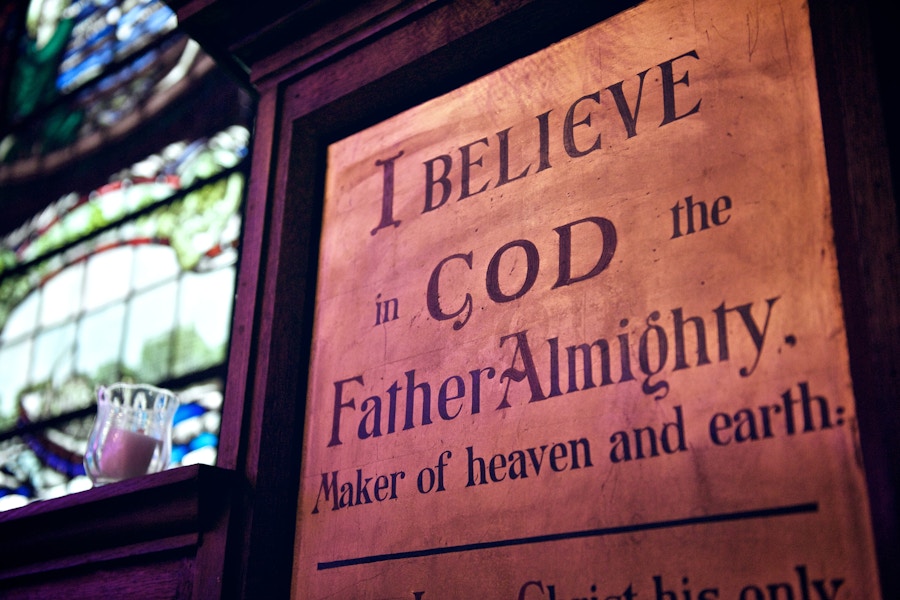Introductory Note:
Credo in unum Deum ... I believe in one God ...
Jesus prayed that we would be one (John 17). We too often appear to be many. But, gifts of the faith like the Apostles’ Creed remind us of the One to whom we belong, and in remembering these words, we recognize that we really are one body, unified in Christ.
Thomas Oden helps us to understand why the Apostles’ Creed is such an important part of our faith heritage in today’s post. We hope you enjoy it.
Renovaré Team
 Excerpt from Classic Christianity
Excerpt from Classic Christianity
Classic teachers as varied as Augustine, Thomas Aquinas, and Luther have held that the Apostles’ Creed remains the best condensed statement of Christian faith and the most reliable way to learn the heart of faith. In professing the Creed, Cyril explained, the believer is helped to keep closely to the center of faith as delivered by the apostles, “which has been built up strongly out of all the Scriptures”:
For since all cannot read the Scriptures, some being hindered from the knowledge of them by lack of learning, and other because they lack leisure to study, in order that the soul should not be starved in ignorance, the church has condensed the whole teaching of the Faith in a few lines. This summary I wish you both to commit to memory when I recite it, and to rehearse it with all diligence among yourselves, not writing it out on paper, but engraving it by the memory upon your heart, taking care while you rehearse it that no catechumen may happen to overhear the things which have been delivered to you. I wish you also to keep this as a provision through the whole course of your life, and beside this to receive no alternative teaching, even if we ourselves should change and contradict our present teaching. (Catech. Lect. 5.12, is here slightly amended)
During the perilous times prior to Cyril, there was an evident reason for memorizing the creed: persecution, torture, imprisonment, including the seizure of sacred books by the authorities, and the lethal prosecution of those that followed them. Thus a tight summary of scripture had to be memorized before baptism. …
The creed in all its classic forms is the “short word” summarizing biblical faith, approved by the apostles as “standard teaching to converts,” “a badge for distinguishing” those who preach Christ according to apostolic rule, constructed “out of living stones and pearls supplied by the Lord” (Rufinus, Comm. on Apostles’ Creed, Intro.). Rufinus (345−410 AD), among the earliest of many commentators on the Creed, taught that the Holy Spirit had superintended its transmission in order that it “contain nothing ambiguous, obscure, or inconsistent.” Poignantly, he explained why it must be committed to memory: “The reason why the creed is not written down on paper or parchment, but is retained in the believers’ hearts, is to ensure that it has been learned from the tradition handed down from the Apostles, and not from written texts, which occasionally fall into the hands of unbelievers.” That sentence echoes directly from the tragic horrors of the Diocletian persecution. Rufinus based his commentary on the personally remembered “text to which I pledged myself when I was baptized into the church of Aquileia.”
The ancient creeds all begin with “I believe” (credo) or “We believe” (credimus). What does it mean to believe? “And what is faith?” the Letter to the Hebrews asked. “Faith gives substance to our hopes, and makes us certain of realities we do not see” (Heb. 11:1). “Without faith it is impossible to please God, because anyone who comes to him must believe that he exists and that he rewards those that earnestly seek him” (Heb. 11:6; Chrysostom, Comm. On Hebrews, 22.6−7). Just as no farmer sweats to plant a field without some faith that the seeds will grow, and no one sets out to sea without some confidence of being able to survive, so: “In fact, there is nothing in life that can be transacted without a preliminary readiness to believe” (Rufinus, Comm. ACW 20:32). In entering the pathway of belief, the inquirer must first listen with empathy to what the worshiping community is saying about the One who makes belief possible.
Oden, Thomas. 1992. Classic Christianity: A Systematic Theology. New York: HarperOne, pp. 10 – 11.


